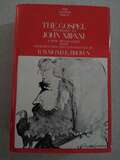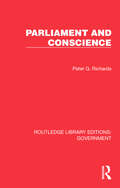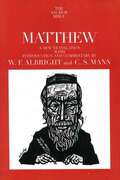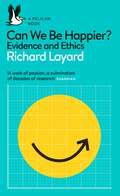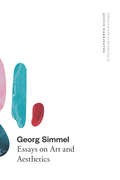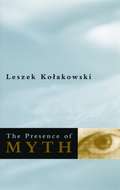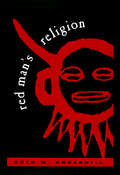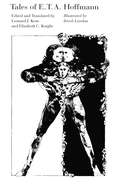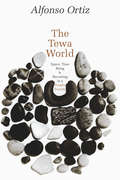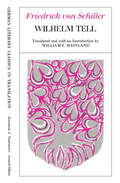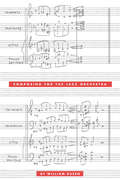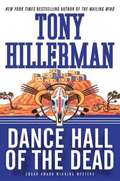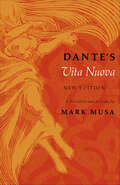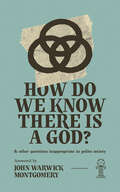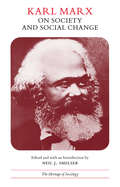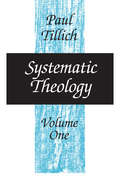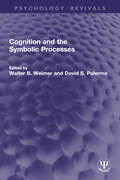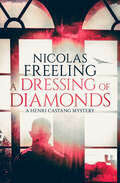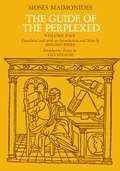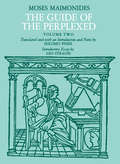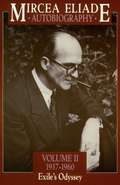- Table View
- List View
Fundamental Accessibility Tests: Read Aloud
by Daisy ConsortiumThese tests include start, pause and resume Read Aloud, reading order, punctuation support and visual emphasis of the spoken text.
The Gospel According To John: Chapters Xiii-xxi (Anchor Bible Ser. #Vol. 29a)
by Raymond E. BrownThis volume concludes Raymond E. Brown's commentary on the Gospel of John. Continuing his study begun in Anchor Bible Volume 29, the author translates the original Greek text into today's English. which allows all readers to make sense of the Gospel.
Parliament and Conscience (Routledge Library Editions: Government)
by Peter G. RichardsOriginally published in 1970, this book has a dual purpose. Firstly, it is a study of how Parliament works when the party whips are withdrawn. The author shows how backbenchers can create legislation of great importance; he demonstrates the obstacles, political and procedural to social reform; he relates the votes of MPs to their personal characteristics e.g. age, religion and occupation, and he argues that Parliament achieves a fresh vigour and authority when MPs think and act independently of party policy. Secondly, Parliament and Conscience analyses 6 major controversies in British society in the late 20th Century: the death penalty, homosexuality, abortion, theatre censorship, divorce and Sunday entertainment.
South Riding
by Winifred HoltbyThe community of South Riding, like the rest of the country, lives in the long shadow of war. Blighted by recession and devastated by the loss, they must also come to terms with significant social change. Forward-thinking and ambitious, Sarah Burton is the embodiment of such change. After the death of her fiancé, she returns home to Yorkshire focused on her career as headmistress of the local school. But not everyone can embrace the new social order. Robert Carne, a force of conservatism, stands firmly against Sarah. A tormented man, he carries a heavy burden that locks him in the past. As the villagers of South Riding adjust to Sarah's arrival and face the changing world, emotions run high, prejudices are challenged and community spirit is tested.
Contemporary Britain: Three Lectures (Routledge Revivals)
by Barbara WoottonFirst published in 1971, Contemporary Britain presents lectures by Barbara Wootton, well known as a socialist and agnostic and her opinions habitually run counter to those of the political Right and occasionally also to those of the Left. In these lectures she surveys the state of the nation from the angle of her personal philosophy, in a wide-ranging review which covers, amongst other topics, collective bargaining and incomes policy; legislation on abortion, censorship and gambling; the validity of opinion polls; the rise in crime, the decline in religious belief, and the need to popularize a secular morality based only on consideration for others.Incisively written and infused with a warm humanity, this book will be an interesting read for students of British politics and political science in general.
Matthew (The Anchor Yale Bible Commentaries) (The Anchor Bible)
by W. F. Albright C. S. MannThis is volume twenty-six of "The Anchor Bible", a new translation done book-by-book with accompanying introduction, notes, and comments."Matthew" is the most familiar of the gospels, best known for its parables, miracle narratives, and the long Sermon on the Mount. Recognized by the early Church as the most fitting introduction to the "New Testament", its special concern is to announce Jesus as the fulfillment of the "Old Testament". Hence its emphasis on the Law, on ethics based on the traditional theology of the Covenant, and on the centrality of Messianic hope.This commentary sets the understanding of "Matthew" in the context of its author's own religious and secular background. Believing that the text should be approached directly, the writers of the commentary make constant use of the recently discovered historical and linguistic evidence now available to elucidate it. This approach results in placing Jesus firmly within the framework of ascertainable Jewish tradition in first-century Palestine.The writers hold that the claim of Jesus to fulfill the Law and not to abolish it must be taken seriously. They have therefore taken a fresh look at the legal discussions in Matthew. In the light of their examination, there emerges first a revaluation of the meaning attached to such key words as "parables" and "hypocrite" and then a new and vital significance for such words.The result is a new respect for "Matthew", a highly reliable early source for the ministry of Jesus, and an examination of that ministry uncluttered by the presuppositions of various forms of modern "Platonism."
Can We Be Happier?: Evidence and Ethics (Pelican Books)
by Richard Layard George WardFrom the bestselling author of Happiness and co-editor of the annual World Happiness ReportMost people now realize that economic growth, however desirable, will not solve all our problems. Instead, we need a philosophy and a science which encompasses a much fuller range of human need and experience.This book argues that the goal for a society must be the greatest possible all-round happiness, and shows how each of us can become more effective creators of happiness, both as citizens and in our own organizations.Written with Richard Layard's characteristic clarity, it provides hard evidence that increasing happiness is the right aim, and that it can be achieved. Its language is simple, its evidence impressive, its effect inspiring.'In this book 'Can We Be Happier?' which is part of Richard Layard's excellent, ongoing exploration of what happiness is and how it can be achieved, he provides evidence that if you have peace of mind and are full of joy, your health will be good, your family will be happy and that happiness will affect the atmosphere of the community in which you live.' The Dalai Lama
Georg Simmel: Essays on Art and Aesthetics (Heritage Of Sociology Ser.)
by Georg SimmelGeorg Simmel is one of the most original German thinkers of the twentieth century and is considered a founding architect of the modern discipline of sociology. Ranging over fundamental questions of the relationship of self and society, his influential writings on money, modernity, and the metropolis continue to provoke debate today. Fascinated by the relationship between culture, society, and economic life, Simmel took an interest in myriad phenomena of aesthetics and the arts. A friend of writers and artists such as Auguste Rodin, Rainer Maria Rilke, and Stefan George, he wrote dozens of pieces engaging with topics such as the work of Michelangelo, Rembrandt, and Rodin, Japanese art, naturalism and symbolism, Goethe, “art for art’s sake”, art exhibitions, and the aesthetics of the picture frame. This is the first collection to bring together Simmel’s finest writing on art and aesthetics, and many of the items appear in English in this volume for the first time. The more than forty essays show the protean breadth of Simmel’s reflections, covering landscape painting, portraiture, sculpture, poetry, theater, form, style, and representation. An extensive introduction by Austin Harrington gives an overview of Simmel’s themes and elucidates the significance of his work for the many theorists who would be inspired by his ideas. Something of an outsider to the formal academic world of his day, Simmel wrote creatively with the flair of an essayist. This expansive collection of translations preserves the narrative ease of Simmel’s prose and will be a vital source for readers with an interest in Simmel’s trailblazing ideas in modern European philosophy, sociology, and cultural theory.
The Presence of Myth
by Leszek Kolakowski"[An] important essay by a philosopher who more convincingly than any other I can think of demonstrates the continuing significance of his vocation in the life of our culture."—Karsten Harries, The New York Times Book Review With The Presence of Myth, Kolakowski demonstrates that no matter how hard man strives for purely rational thought, there has always been-and always will be-a reservoir of mythical images that lend "being" and "consciousness" a specifically human meaning. "Kolakowski undertakes a philosophy of culture which extends to all realms of human intercourse—intellectual, artistic, scientific, and emotional. . . . [His] book has real significance for today, and may well become a classic in the philosophy of culture."—Anglican Theological Review
Red Man's Religion: Beliefs and Practices of the Indians North of Mexico
by Ruth MurrayAmong the topics considered in this classic study are world origins and supernatural powers, attitudes toward the dead, the medicine man and shaman, hunting and gathering rituals, war and planting ceremonies, and newer religions, such as the Ghost Dance and the Peyote Religion. "The distinctive contribution of [Red Man's Religion] is the treatment of topics, the insight and the perspective of the author, and her ability to transmit these to the reader. . . . Trais and aspects of religion are not treated as abstract entitites, to be enumerated and summated, assigned a geographic distribution, and then abandoned. No page is a dry recital; each is an illumination. Insight and wisdom are framed in poetic prose. An offering of information in such a medium merits gratitude."—American Anthropologist
Tales of E. T. A. Hoffmann
by E.TA. HoffmannRanging from macabre fantasies to fairy tales and tales of crime, these stories from the author of The Nutcracker create a rich fictional world. Hoffman paints a complex vision of humanity, where people struggle to establish identities in a hostile, absurd world. "The editors have made an excellent selection, and the result is a book of great distinction."—Denis Donoghue, New York Review of Books "The translators have proved fully equal to all the challenges of Hoffmann's romantic irony and his richly allusive prose, giving us an accurate and idiomatic rendering that also retains much of the original flavor."—Harry Zohn, Saturday Review
The Tewa World: Space, Time, Being and Becoming in a Pueblo Society
by Alfonso Ortiz"This is a book that springs from richness. . . valuable not only for anthropologists and sociologists. . . the interested but unskilled layman will find a treasure trove as well. One thing seems certain. If this book does not become THE authority for the scholar, it will certainly never be ignored. Ortiz has done himself and his people proud. They are both worthy of the acclamation."—The New Mexican
Wilhelm Tell (German Literacy Classics in Translation)
by Friedrich von SchillerWhen Schiller completed Wilhelm Tell as a "New Year's Gift for 1805" he foretold that it would cause a stir. He was right. In the midst of Great Power politics a play which drew substance from one of the fourteenth-century liberation movements proved both attractive and inflammatory. Since then the work as become immensely popular. This new English translation by William F. Mainland brings out the essential tragi-comic nature of Wilhelm Tell but also emphasizes its impressive formal unity. Schiller based his play on chronicles of the Swiss liberation movement, in which Wilhelm Tell played a major role. Since Tell's existence has never been proven, Schiller, a historian by profession, felt he had to devise a figure who would bring the uncertainties and contradictions of the various Swiss chronicles into focus. Respected for his courage and skill with a bow, for his peaceable nature and his integrity, Schiller's archer—while always ready to aid his fellows—habitually seeks solitude. In the midst of political turmoil Wilhelm Tell is the nonpolitical man of action. Keenly interested in the problematic interplay of history and legend, Schiller turned it to be dramatic advantage. He constructed his play to illustrate the greatest possible development of the character traits suggested for Tell by the chronicles. The result of Schiller's supreme achievement in historical drama.
Composing for the Jazz Orchestra
by William Russo"Although it will be of primary interest to those who are engaged in composition themselves, [this] book is also recommended for readers who may wish to gain further insight into just what makes jazz composition so different from traditional approaches."—Malcolm Bessom, The Music Magazine
Concrete Island: A Novel
by J. G. BallardOn a day in April, just after three o'clock in the afternoon, Robert Maitland's car crashes over the concrete parapet of a high-speed highway onto the island below, where he is injured and, finally, trapped. What begins as an almost ludicrous predicament soon turns into horror as Maitland-a wickedly modern Robinson Crusoe-realizes that, despite evidence of other inhabitants, this doomed terrain has become a mirror of his own mind. Seeking the dark outer rim of the everyday, Ballard weaves private catastrophe into an intensely specular allegory in Concrete Island.
Dance Hall of the Dead (A Leaphorn and Chee Novel #2)
by Tony HillermanDon’t miss the TV series, Dark Winds, based on the Leaphorn, Chee, & Manuelito novels, now on AMC and AMC+! The Edgar-Award winning second novel in New York Times bestselling author Tony Hillerman’s bestselling and highly acclaimed Leaphorn and Chee series“Hillerman is a wonderful storyteller.”—New York Times Book ReviewTwo Native American boys have vanished into thin air, leaving a pool of blood behind them. Lieutenant Joe Leaphorn of the Navajo Tribal Police has no choice but to suspect the very worst, since the blood that stains the parched New Mexico ground once flowed through the veins of one of the missing, a young Zuñi. But his investigation into a terrible crime is being complicated by an important archaeological dig . . . and a steel hypodermic needle. And the unique laws and sacred religious rites of the Zuñi people are throwing impassable roadblocks in Leaphorn’s already twisted path, enabling a craven murderer to elude justice or, worse still, kill again.
Dante's Vita Nuova: A Translation and an Essay
by Dante AlighieriIn this new edition Musa views Dante's intention as one of cruel and comic commentary on the shallowness and self-pity of his protagonist, who only occasionally glimpses the true nature of love. ". . . the explication de texte which accompanies [Musa's] translation is instructively novel, always admirable. . . . This present work offers English readers a lengthy appraisal which should figure in future scholarly discussions." —Choice
How Do We Know There Is A God?: And Other Questions Inappropriate in Polite Society
by John Warwick MontgomeryDr. Montgomery tackles Christianity's most troubling questions, with answers derived from the ultimate answer book, the Bible: What is God really like? Can we scientifically explain miracles? Isn't the story of creation really a myth? Don't all religions lead us to heaven?
Karl Marx on Society and Social Change (The Heritage of Sociology)
by Karl MarxThis volume presents those writings of Marx that best reveal his contribution to sociology, particularly to the theory of society and social change. The editor, Neil J. Smelser, has divided these selections into three topical sections and has also included works by Friedrich Engels. The first section, "The Structure of Society," contains Marx's writings on the material basis of classes, the basis of the state, and the basis of the family. Among the writings included in this section are Marx's well-known summary from the Preface of A Contribution to a Critique of Political Economy and his equally famous observations on the functional significance of religion in relation to politics. The second section is titled "The Sweep of Historical Change." The first selection here contains Marx's first statement of the main precapitalist forms of production. The second selection focuses on capitalism, its contradictions, and its impending destruction. Two brief final selections treat the nature of communism, particularly its freedom from the kinds of contradictions that have plagued all earlier forms of societies. The last section, "The Mechanisms of Change," reproduces several parts of Marx's analysis of the mechanisms by which contradictions develop in capitalism and generate group conflicts. Included is an analysis of competition and its effects on the various classes, a discussion of economic crises and their effects on workers, and Marx's presentation of the historical specifics of the class struggle. In his comprehensive Introduction to the selections, Professor Smelser provides a biography of Marx, indentifies the various intellectual traditions which formed the background for Marx's writings, and discusses the selections which follow. The editor describes Marx's conception of society as a social system, the differences between functionalism and Marx's theories, and the dynamics of economic and political change as analyzed by Marx.
Systematic Theology
by Paul TillichThis is the first part of Paul Tillich's three-volume Systematic Theology, one of the most profound statements of the Christian message ever composed and the summation and definitive presentation of the theology of the most influential and creative American theologian of the twentieth century. In this path-breaking volume Tillich presents the basic method and statement of his system—his famous "correlation" of man's deepest questions with theological answers. Here the focus is on the concepts of being and reason. Tillich shows how the quest for revelation is integral to reason itself. In the same way a description of the inner tensions of being leads to the recognition that the quest for God is implied in finite being. Here also Tillich defines his thought in relation to philosophy and the Bible and sets forth his famous doctrine of God as the "Ground of Being." Thus God is understood not as a being existing beside other beings, but as being-itself or the power of being in everything. God cannot be made into an object; religious knowledge is, therefore, necessarily symbolic.
Cognition and the Symbolic Processes (Psychology Revivals)
by David S. Palermo Walter B. WeimerOriginally published in 1974 and taking the revolution in psycholinguistics and cognitive psychology as a point of departure, this book summarizes the lessons learned from past attempts to construct a psychology of the higher mental processes. Even more importantly, it crystallizes specific directives and research proposals that show where cognitive psychology ought to go in the future. The relationship of learning theory, linguistics, and perception to the broad field of cognition and the nature of mind and knowledge are examined in detail. Today it can be read in its historical context.
A Dressing of Diamonds (The Henri Castang Mysteries)
by Nicolas FreelingUnorthodox French detective Henri Castang investigates a kidnapping in this police procedural from an Edgar award–winning British crime novelist.When the daughter of a prominent official goes missing, Inspector Henri Castang is certain the abduction is an act of revenge against the child’s mother. Not only is Collette Delavigne one of France’s youngest judges, but as a magistrate of crimes involving children, Delavigne has certainly aroused a few enemies. But how to find the perpetrator in a sea of cases that could easily have inspired a vengeful kidnapping? All Castang knows for sure is that he needs to act fast, in case the kidnapper has murder on his mind . . . Praise for Nicolas Freeling:“In depth of characterization, command of language and breadth of thought, Mr. Freeling has few peers when it comes to the international policier.” —The New York Times“Nicolas Freeling . . . liberated the detective story from page-turning puzzler into a critique of society and an investigation of character.” —The Daily Telegraph“Freeling rewards with his oblique, subtly comic style.” —Publishers Weekly“Freeling writes like no one. . . . He is one of the most literate and idiosyncratic of crime writers.” —Los Angeles Times
The Guide of the Perplexed, Volume 1
by Moses MaimonidesThis monument of rabbinical exegesis written at the end of the twelfth century has exerted an immense and continuing influence upon Jewish thought. Its aim is to liberate people from the tormenting perplexities arising from their understanding of the Bible according only to its literal meaning. This edition contains extensive introductions by Shlomo Pines and Leo Strauss, a leading authority on Maimonides.
The Guide of the Perplexed, Volume 2
by Moses MaimonidesThis monument of rabbinical exegesis written at the end of the twelfth century has exerted an immense and continuing influence upon Jewish thought. Its aim is to liberate people from the tormenting perplexities arising from their understanding of the Bible according only to its literal meaning. This edition contains extensive introductions by Shlomo Pines and Leo Strauss, a leading authority on Maimonides.
Mircea Eliade: Exile's Odyssey, 1937–1960
by Mircea Eliade"Here finally are Eliade's memoirs of the first thirty years of his life in Mac Linscott Rickett's crisp and lucid English translation. They present a fascinating account of the early development of a Renaissance talent, expressed in everything from daily and periodical journalism, realistic and fantastic fiction, and general nonfiction works to distinguished contributions to the history of religions. Autobiography follows an apparently amazingly candid report of this remarkable man's progression from a mischievous street urchin and literary prodigy, through his various love affairs, a decisive and traumatic Indian sojourn, and active, brilliant participation in pre-World War II Romanian cultural life."—Seymour Cain, Religious Studies Review

